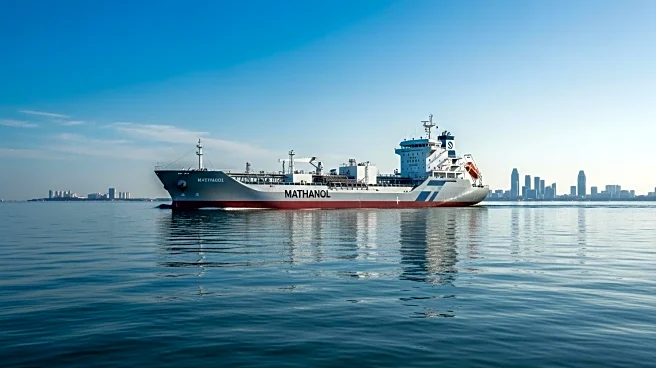What's Happening?
The Fratelli Cosulich Group has launched the Maya Cosulich, the world's first methanol-powered IMO II chemical bunker tanker, at Taizhou Maple Leaf Shipyard. The launch ceremony was attended by Ms. Hoe Sook Mei from the Fratelli Cosulich Singapore office, who served as the Godmother of the vessel. Designed by SeaTech Solutions International Pte Ltd, the Maya Cosulich is equipped with diesel-electric propulsion, onboard battery storage, and two mass flow meters (MFMs). It complies with the Maritime and Port Authority of Singapore's methanol bunkering standards, setting a new benchmark for the safe and efficient delivery of alternative marine fuels in the region. The tanker is expected to arrive in Singapore by the end of 2025 and will operate under a time charter with TFG Marine, marking the first methanol dual-fuel bunker tanker to operate in the Port of Singapore.
Why It's Important?
The launch of the Maya Cosulich represents a significant advancement in the maritime industry’s shift towards sustainable fuel options. Methanol is considered a cleaner alternative to traditional marine fuels, reducing emissions and environmental impact. This development aligns with global efforts to decarbonize shipping and meet international environmental standards. The collaboration between Fratelli Cosulich Group, TFG Marine, and the Maritime and Port Authority of Singapore highlights the growing importance of partnerships in achieving sustainable maritime operations. The introduction of methanol-powered vessels could influence other shipping companies to adopt similar technologies, potentially leading to broader industry changes and increased demand for methanol as a marine fuel.
What's Next?
Upon delivery to Singapore, the Maya Cosulich will begin operations under TFG Marine's charter, serving as a model for future methanol-powered vessels. The successful implementation of this technology may encourage further investment in methanol bunkering infrastructure and technology development. Stakeholders in the maritime industry, including shipbuilders and fuel suppliers, may explore similar projects to capitalize on the growing demand for sustainable shipping solutions. Regulatory bodies may also consider updating standards and guidelines to accommodate the increasing use of alternative fuels, ensuring safety and compliance in maritime operations.
Beyond the Headlines
The adoption of methanol as a marine fuel could have long-term implications for the shipping industry, including shifts in fuel supply chains and changes in vessel design standards. As environmental regulations become more stringent, the industry may see increased pressure to innovate and adopt cleaner technologies. This transition could also impact global trade patterns, as ports and shipping routes adapt to accommodate new fuel types. Additionally, the success of methanol-powered vessels may spur research into other alternative fuels, further diversifying the energy sources used in maritime transport.








